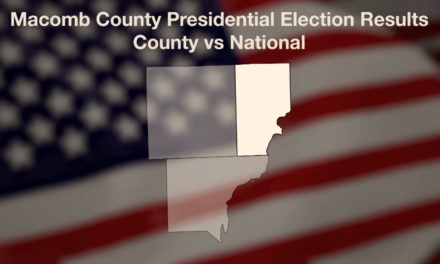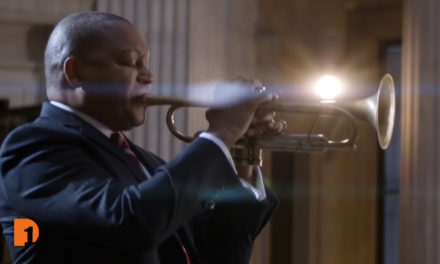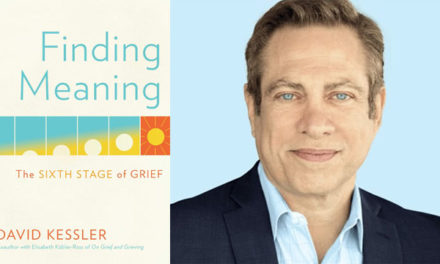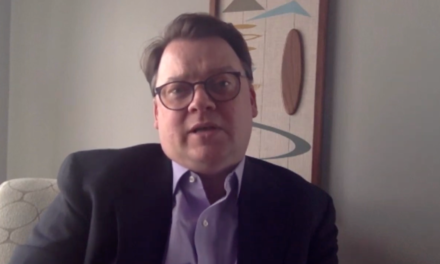Read full transcript:
Christy McDonald Joining me now is Rochelle Riley, she’s the Director of Arts and Culture for the City of Detroit. But you know her as a voice from the Detroit Free Press, as a columnist, three years here in the city, Rochelle. It’s great to see you.
Rochelle Riley, Director of Arts and Culture, City of Detroit Thank you so much for having me.
Christy McDonald So tell me, how’s everything been for you?
Rochelle Riley, Director of Arts and Culture, City of Detroit Well, I can tell you, we were going gangbusters and having a great old time in January and half of February when we were talking about the new office of arts and culture: Arts, Culture and Entrepreneurship and all of the plans that the mayor and I wanted to get started on. And then, of course, like everyone else in the world, we were hit with Covid. And everything now is about working together to help each other, making sure that these artists who I’ve been working with for the advent of new programing can now just survive the pandemic so that they can make sure that they’re here and strong post-pandemic.
Christy McDonald It’s really an amazing shift. And you’ve been in this job now for almost a year, but of course, you know the city so well, but what new things have you discovered about the arts and culture scene in the city since being in this post?
Rochelle Riley, Director of Arts and Culture, City of Detroit You know, the most stunning thing over this 11 months and a little time and I will have a celebration no matter what–that one year anniversary–is that people do not understand just how fabulous we are. We have world class art, artists, musicians, sculptors, comics, dancers. And we don’t really celebrate a lot. So I am thrilled to be able to bring that crusading spirit that I had with my column when it was about politics and race and children and bring it to arts and artists and some of the best programs in the country. Everything that exists, every place else, whether it’s New York or Los Angeles or some place in my hometown of North Carolina, we have it all here, and we have the ability to soar with it. So that’s number one.
I want people to know what we’ve got here. And the second thing is to make sure that all of our artists can make a living here. A lot of our artists have to go outside of Michigan because they’re well-known. They said that there are organizations and companies who will call, you know, Chicago or L.A. and say, we want you to come and do this. And they’re met with all I can come and do it with. The person who taught me is right there in Detroit. For the person who’s the best at this is right there in Detroit. I’m going to be working a lot on that.
Christy McDonald You know, we talk about the artists and the musicians, the sculptors. I mean, now because of Covid-19, this crisis, the gigs are no longer there. The ability to be able to go and reach the public and interact in a live way and in a space is no longer there.
What are some of the personal stories that artists are telling you about, some of the struggles that they’re having right now during this lockdown?
Rochelle Riley, Director of Arts and Culture, City of Detroit You know, I want to I wish I’d had it. I would’ve worn a T-shirt that says ‘artists are people, too’. There’s this sense that because you’re an artist, no matter how you make a living, that you are well off, you’re somebody who doesn’t need help or attention. And quite frankly, they are some of the people who need help the most, because as you said, when the venues shut down, gigs were canceled, exhibitions and book tours were canceled. I’ve talked to so many artists who have no income right now because all of their income was based on their talent, based on their appearances.
That’s why Mitch Albom and I got together to do this Metro Detroit Covid-19, Artists Crisis Emergency Fund. You’ll hear me do lots of things with A.C.E., which is also the name of my office. It’s vital that we raise some money to make sure they do it because they’re not small businesses. So these small business initiatives do not help them. And some of them, because they’re paid in cash, can’t prove a lot of unemployment. So some of them are not getting unemployment benefits. So when I say they have no money, I want to come out of this where we have these brilliant people still in Detroit and they don’t feel like they have to go someplace else because we don’t love them because we love them.
Christy McDonald So talk about A.C.E. and what the plan is, a virtual tell, a virtual telethon of sorts and performances talked about how that’s all coming together and what we’re going to see soon.
Rochelle Riley, Director of Arts and Culture, City of Detroit I am so excited. We have artists sending in their videos from everywhere. But this fund is for Wayne and Oakland County because so many of our artists are in that whole area that perform and work and teach art to children in Detroit. So we’re going to have this telethon that’s based on several of those video performances and it’s going to be artists either performing or showing how they craft or talking about their work. And Mitch and I will do some pleas in between to remind you how you can support that. But we also have people from all over the place. You know, I’ve asked actors and other musicians and supporters and just, you know, you’ll be surprised by some of the people who are just sending these messages of encouragement and hope and and reminding people to donate. We’re also going to toss in a few census reminders because as you know, all the money that we get from the federal government is based on our size and making sure that we get counted. And there’s no better time than to explain to people how important it is to fill out the census when we’re asking for money for a pandemic.
Christy McDonald So when you’re talking about the fund, you’re looking to raise, what, fifty thousand dollars?
Rochelle Riley, Director of Arts and Culture, City of Detroit Yes.
Christy McDonald And then how would you then distribute those grants to the artists?
Rochelle Riley, Director of Arts and Culture, City of Detroit Well, as you know, the city of Detroit and I do not touch the money. I have no math skills. I would not want to. Metro Solutions out of Detroit, just one of the best fiduciary is in which works with every other organization. It’s handling the applications, which are very simple. If you’re an artist, if you have money, you get it. And also handling the distributions, either be a check or cash app or however an artist needs to get it. So they are coordinating the funds, which is a go fund me campaign that you can find at detroitmi.gov/ace. I said that right? Detroitmi.gov/ace. It tells artists how to apply. And it tells you how to donate. And they will be distributing the money. They will keep a list of everybody we helped because eventually I want to do an artist census so I can prove that we have more creative than any other city in America.
Christy McDonald And while you’re we’re kind of in this, it is trauma mode really right now and helping our artists. I’m sure you have some plans for further down the road when we all can congregate and all be together once again.
Rochelle Riley, Director of Arts and Culture, City of Detroit Well, I’m splitting my time three ways. One is to continue to remind people that when the pandemic is over, we can go back to where I was in the first place, which is creating the Detroit Arts Fund to make sure that we have funding for artists to make it easier for our foundation who have been heroic in their funding, don’t always get hit with twelve hundred application applications for funding. A lot of them from people doing the same thing. It’s to provide a little organization and to make sure there is a resource somewhere that people know the city can provide.
The third of my time is spent on that and those programs that I announced with the mayor back in February that include neighborhood art houses, arts fellows in the areas where the city is transforming neighborhoods. Then, third of my time is being spent on post-pandemic. What does that look like? We have a whole team at city hall that’s looking at that period like for artists and all of our residents and all of our folks who want to make sure that the Detroit that comes out on the other side of the pandemic looks great, just like Detroit coming out of bankruptcy. I’m looking for the second great bargain where people will just realize this is what we need to do.
And then the last part really is focused on something that the mayor has tasked to do that is probably one of the most important things that I’ll ever do, and that’s to design and create and plan how we’re going to mourn those we lost–that memorial whatever it looks like, whatever it feels like, what it is, is something that I’ve been working on for two weeks now.
Christy McDonald There is a lot of pain because people aren’t able to gather together. They’re not able to celebrate those that we’ve lost. And it feels like it just keeps coming in waves. I’ve talked to people who say they look through their Facebook feed and it is like an obituary page. What are people telling you about the need to connect and what that will look like on the other side?
Rochelle Riley, Director of Arts and Culture, City of Detroit There are three very important things. The first is the need to reconnect. It’s gonna be a little while before we can hug each other, before we can shake hands, before we’re greeting people with, hey, how are you? And a pat on the back instead of, ‘Where’s your mask’?
Or ‘are you OK?’ Or ‘please stay away.’ That is that is really totally a.. what we’ve become over the past two years, Detroit is we’re a strong city where there’s a lot of us southerners and we believe in hugging. We believe in checking on you. We believe in taking food to people who are sick. We can’t even visit people in hospitals. So that reconnecting is important. But the other thing is we really are going to have to have a time to mourn and to heal.
I’ve lost eight people and, unfortunately, I have not been able to touch anyone or to attend a funeral or to even say a word face to face to anyone connected to that. There’s a lot of phone calls. There’s a lot of emails. There’s a lot of ordering of flowers or things. But none of that necessarily. You know, the Jewish people call it sitting shiva. We haven’t had a chance to sit shiva for anybody. We haven’t had a chance to even–the post traumatic phase of this is stunning because you’re losing so many people so quickly. By the time it’s over, you’re going to look back in shock and realize that all those people are gone. So that healing is necessary.
And then the third thing again is what I mentioned before, we have to come out on the other side of this, ready to get back to where we were. Detroit is in such a good place. Detroit is like the envy of cities across the country because of what we look like now, what we’re accomplishing now. And we can’t lose that. We can’t let the pandemic take that. So we’ve got to make sure that people are getting back home, that the kids are back in school and not so far behind, and that the artists are ready to roll. I want to be able to announce something the first day the mayor says, OK. This is the beginning of, you know, post-Covid. Everything is pre-C and post-C. So, we want to be ready.
Christy McDonald All right. Well, Rochelle, thanks so much for the time. Rochelle Riley from–the Arts and Culture Director of the City of Detroit. It’s great to see you.
Rochelle Riley, Director of Arts and Culture, City of Detroit Thank you so much for doing this. And send people to the fund, detroitmi.gov/ace.




